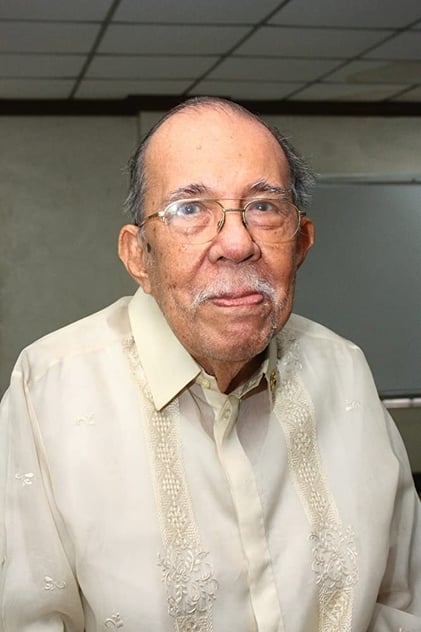

Eddie Romero
Born: July 7, 1924
Died: May 28, 2013
in Dumaguete City, Philippines
Died: May 28, 2013
in Dumaguete City, Philippines
From Wikipedia, the free encyclopedia.
Eddie Romero (born July 7, 1924) is an acclaimed and influential Filipino film director, film producer and screenwriter, considered one of the finest in the Cinema of the Philippines. Romero was named National Artist of the Philippines in 2003.
His career spans three generations of filmmakers. His 1976 film "Ganito Kami Noon…Paano Kayo Ngayon?," set at the turn of the century during the revolution against the Spaniards and, later, the American colonizers, follows a naïve peasant through his leap of faith to become a member of an imagined community.
"Agila" situates a family’s story against the backdrop of the country’s history.
"Kamakalawa" explores the folklore of prehistoric Philippines.
"Banta ng Kahapon," his 'small' political film, is set against the turmoil of the late 1960s, tracing the connection of the underworld to the corrupt halls of politics.
His 13-part series of "Noli Me Tangere" brings Philippine national hero Jose Rizal’s novel to a new generation of viewers.
Romero's films, the National Artist citation states, "are delivered in an utterly simple style – minimalist, but never empty, always calculated, precise and functional, but never predictable."
Quentin Tarantino has drawn upon Romero's film Twilight People as an inspiration for his "grindhouse" homages.
Married to Carol Gonzalez, Romero was for a time the partner of actress Mila del Sol.
Description above from the Wikipedia article Eddie Romero, licensed under CC-BY-SA, full list of contributors on Wikipedia.
Eddie Romero (born July 7, 1924) is an acclaimed and influential Filipino film director, film producer and screenwriter, considered one of the finest in the Cinema of the Philippines. Romero was named National Artist of the Philippines in 2003.
His career spans three generations of filmmakers. His 1976 film "Ganito Kami Noon…Paano Kayo Ngayon?," set at the turn of the century during the revolution against the Spaniards and, later, the American colonizers, follows a naïve peasant through his leap of faith to become a member of an imagined community.
"Agila" situates a family’s story against the backdrop of the country’s history.
"Kamakalawa" explores the folklore of prehistoric Philippines.
"Banta ng Kahapon," his 'small' political film, is set against the turmoil of the late 1960s, tracing the connection of the underworld to the corrupt halls of politics.
His 13-part series of "Noli Me Tangere" brings Philippine national hero Jose Rizal’s novel to a new generation of viewers.
Romero's films, the National Artist citation states, "are delivered in an utterly simple style – minimalist, but never empty, always calculated, precise and functional, but never predictable."
Quentin Tarantino has drawn upon Romero's film Twilight People as an inspiration for his "grindhouse" homages.
Married to Carol Gonzalez, Romero was for a time the partner of actress Mila del Sol.
Description above from the Wikipedia article Eddie Romero, licensed under CC-BY-SA, full list of contributors on Wikipedia.
Movies for Eddie Romero...

Title: Salamat sa Alaala
Character: Himself
Released: August 9, 2015
Type: Movie
The documentary serves as a tribute to National Artist for Cinema Gerardo de Leon in celebration of his Centennial Year. “Salamat sa Alaala.” is inspired by the music composed by the late film director when he was a teenager playing background music for silent movies in Manila theatres. The video opens up with a capsulated history of the birth of the Filipino movies followed by a series of shots of veteran actresses, the academe and the young generation of filmmakers affirming his unique qualities as a world-class film figure. Then we unravel his private life as a family man. The documentary is one way of thanking him for his lasting legacy in the art form he left behind.


Title: Machete Maidens Unleashed!
Character: Self
Released: October 15, 2010
Type: Movie
In the final decades of the 20th century, the Philippines was a country where low-budget exploitation-film producers were free to make nearly any kind of movie they wanted, any way they pleased. It was a country with extremely lax labor regulations and a very permissive attitude towards cultural expression. As a result, it became a hotbed for the production of cheapie movies. Their history and the genre itself are detailed in this breezy, nostalgic documentary.
